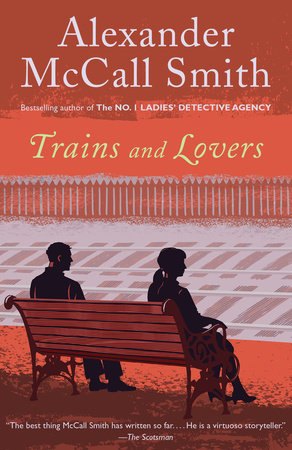Trains and Lovers Reader’s Guide
By Alexander McCall Smith


1. What is the importance of poetry in this novel, and in life? Which poets are discussed and why does Alexander McCall Smith choose these particular poets? Do you agree with the narrator that trains are poetic? How?
2. “Trains are everyday, prosaic things, but they can be involved in, be the agents of, so much else” (p. 7). What is the narrator referring to here about trains and life?
3. Do you agree with the statement that our need for love is “that part of our human life that for so many far outweighs any other” (p. 7)? Is love our most basic need?
4. Describe the four people on the train into whose lives we get a glimpse. Why do you think McCall Smith has chosen this particular assortment of four? Why not two men and two women? Why not all older characters who might have more stories and more experience with love? With which of the characters do you most identify? Whose story did you like the best? Why?
5. What simple message can you distill from each of the four characters’ stories?
6. Do you believe that a life achieving “a well-kept station and some flowers in the desert” (p. 239) is enough as long as you have love? Why or why not?
7. At the close of the novel, as the train enters King’s Cross station and the four are saying goodbye and going their separate ways, Kay contemplates that “each of us has his or her reasons, for making this journey, for being as we are, for continuing with the lives we lead” (p. 240) and that we all travel ordinary paths “touched here and there with moments of understanding and insight, and sheer marvel.” What is the epiphany Kay comes to, which summarizes the underlying theme of the novel?
8. The Examined Life by Robert Nozick is referenced in Trains and Lovers. Have you read this philosophical best seller, and, if so, how do you feel about it? One of the characters says that “the unexamined life was not worth leading” (p. 198), and in order to make sense of life, we need to look at our individual paths, our stories, our decisions, and so on, and ask why. Do you agree or disagree?
9. Why does David not tell his story aloud?
10. How do you feel about each of the stories? Do you sympathize with the characters and their predicaments? Does each of the stories offer universal life lessons?
11. Natural beauty is important in all of McCall Smith’s novels. Kay’s mother created beauty in an unexpected place and brought happiness to her husband, herself, and many travelers. How does natural beauty affect you? Do you surround yourself with it, seek it out, or create it yourself?
12. Andrew doesn’t create beauty but studies it in the history of art and working at an auction house. Against the wishes of his parents, he studied art history instead of accountancy, law, or medicine. This, he said, “led me out of the narrow world of my life in a small Scottish town and into a world of light and intellectual passion” (p. 20). Were his parents wrong to wish otherwise? Was he? Or must everyone follow his or her own dreams and paths?
13. “Journeys are not only about places, they are also about people, and it may be the people, rather than the places, that we remember” (p. 5). Discuss this statement and give examples from your own life.
14. Ethical dilemmas always arise in McCall Smith novels and the characters, especially in the No. 1 Ladies’ Detective Agency and Isabel Dalhousie series, deal with them in gallant and sometimes surprising ways. What are the ethical dilemmas in this novel? How do the characters deal with them and how are they resolved?
15. How does forgiveness play a role in this novel, particularly in the stories of Andrew and Hugh? And what does the narrator imply about judging others too harshly?
16. Why do you think McCall Smith chose the simple plotline of four travelers swapping stories for this novel about love? How does the language and rhythm correspond to the message of Trains and Lovers? What is the author saying about love and about life? If you’ve read McCall Smith’s other novels, do you agree that this is the most romantic of his works?
Just for joining you’ll get personalized recommendations on your dashboard daily and features only for members.
Find Out More Join Now Sign In